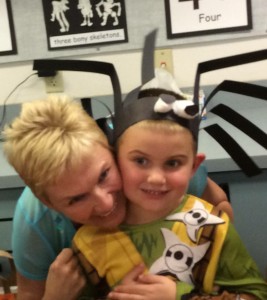Grandma, Grandma, Grandma!
Occasionally I collect my granddaughter from preschool. Last week when I entered the play yard, Bean saw me from the other side of the climbing equipment. She ran all the way around it, arms held out wide, shouting “Grandma! Grandma! Grandma!” As she jumped into my arms, I felt as if I had just won a jackpot. To have this bundle of energy, this smart, strong, cheerful child in my life, and to have her so happy to see me, felt like a valuable gift.
I have written elsewhere on this blog about the health benefits of spending time with grandchildren, so I won’t duplicate those here. But I’m pretty sure I get younger every time I spend an afternoon playing with Bean.
What I want to talk about today, however, is the benefits to children and their families of grandparents spending quality time with their grandchildren . . . kind of the other way around.
Beyond Greeting Card Kitsch: The Value of Pops and Nana
We’ve all seen the cute posters and greeting cards proclaiming the appeal of Pops and Nana to their grandchildren: They are the givers of cookies and kisses, the owners of cozy laps, and the instigators of mischief the children haven’t thought of yet. But there is more to the value of Pops and Nana than the stardust Alex Haley quipped that we sprinkle over the lives of little children.
Research tells us that there are seriously good reasons for grandparents to be regularly involved in children’s lives.
According to the American Association of Retired Persons (AARP), 4.9 million children (7 percent) under age 18 lived in grandparent-headed households in 2010. That’s up from 4.5 million living in grandparent-headed households 10 years earlier. Clearly, for those children, their grandparents have become a lifeline, the source of their security, stability, and sustenance.
Researchers have long held that close grandparent relationships can contribute to children’s cognitive, behavioral, and social development. We now know that grandparents also play key roles in connecting the generations, in transmitting family history and social values, and providing nurture and comfort to grandchildren of all ages.
Family Systems Theory
Grandchildren who live in homes in which poverty, neglect, substance abuse and/or violence exist are especially in need of the influences that grandparents can offer. In 2006 Merril Silverstein and Sarah Ruiz of the Leonard Davis School of Gerontology published the results of a study “examining whether social cohesion with grandparents moderated the intergenerational transmission of depressive symptoms from mothers to their adolescent and young adult children.”
The Silverstein study identified three variables that were determined to be critical to the grandchild-grandparent relationship if it was to offer protective influence:
- Strength of emotional closeness
- Frequency of contact
- Source of social support
Emotional closeness was measured by asking youngsters how close they felt (on a scale of 0-10) to each of up to four grandparents. Frequency of contact was measured on a five-point scale ranging from “not at all” to “more than once per week.” According to Silverstein and Ruiz, social support in the grandparent relationships is demonstrated by grandchildren indicating how likely it was that they would talk to their grandparents if they had a major decision to make or felt depressed or unhappy. Responses ranged on a five-point scale from “definitely would” to “definitely wouldn’t.”
The focus of this study was to test the hypothesis that grandparents can buffer the intergenerational transmission of mothers’ depression to adolescents and young adults (they can). However, it also suggests that grandparents can help children cope with other stressors, such as divorce and marital stability, drug or alcohol abuse, serious health issues, and unemployment, as long as they have a regular and intimate relationship with the children in question.
The Importance of Regular Contact
Research on the impact of grandparents on children’s well being has shown that school age children and adolescents are more likely to turn to their grandparents for advice and support if their relationship was close and frequent during early childhood. Grandparents clearly have the opportunity to play key roles in the lives of their grandchildren, but parents are the gatekeepers to those relationships. The relationship between grandparents and their children and partners is key in encouraging, or discouraging, regular social contact between the generations.
There are many issues that influence those relationships, and I will be discussing some of them in the next few weeks. Some grandparents have been banned from visiting their grandchildren; others face geographic barriers to face-to-face visits. Divorce, remarriage, differences in parenting philosophies, religion, politics . . . all can influence the ability of grandparents to forge close relationships with their grandchildren.
I hope that you will participate in this conversation by contributing a comment at the bottom of this page. How has your family integrated grandparents into the lives of the children? If you haven’t, what barriers exist that prevent this from happening?
In order to make sure you do not miss any future articles on this topic, you can request that my weekly blog arrives in your email each week. Simply enter your name and email address in the subscription form at the top of this post.
Share this post




